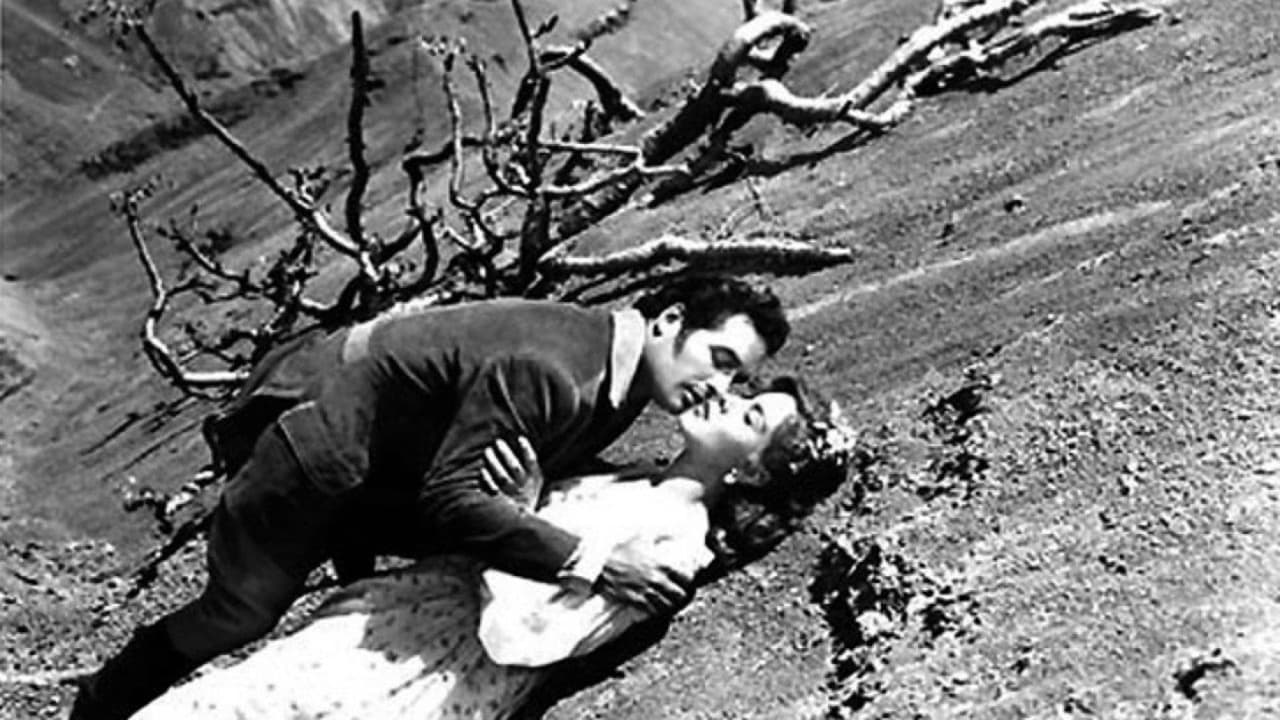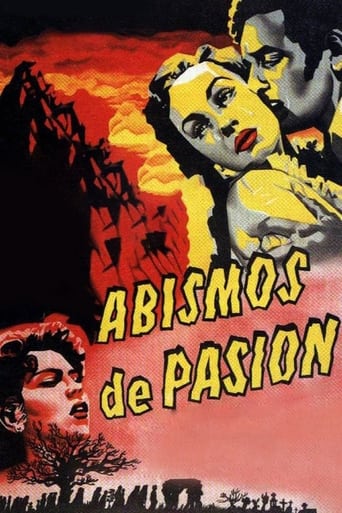




The greatest movie ever made..!
Let's be realistic.
It is not only a funny movie, but it allows a great amount of joy for anyone who watches it.
View MoreStory: It's very simple but honestly that is fine.
Believe or not, this is the best adaptation of the marvelous and romantic story written by Emily Brontë in the Yorkshire Moors! Of course there are more faithful to the letter of the novel in those series made by the BBC long ago, but not the recent ones. The line story is so complicated that is very difficult for a movie to cover it fully. It's hardly believable that this Mexican movie does it so well as to be the best film on the subject, but that is the miracle of Art,It doesn't belong to a place, but to all places, nor to a particular language, but to all languages. Buñuel's genius operates the miracle, aided by his excellent cast and team. This is the one version that captures the roots of Cathy's and Heathcliff's deep and contradictory emotions, the passions, the love and hate they shared and suffered, being all of them doomed to be unhappy in this world and hoping to be redeemed and united in the other. Placed in Mexico, black and white excellent photography, with a believable and intense cast, and a passionate, yet sometimes ironic direction, you must not judge before watching it. It is a great movie!
View MoreThe key distinction, I think between Bronte's "Wuthering Heights" and Bunuel's is his more psychological/surreal framework. Although both present a heroine who is insistently independent, special, and almost emotionally omnipotent, Catalina is more contracted from the world and its influences than is Catherine. Bunuel begins in medio with Alehandro's return, and ends with his murder, an invented climax that considerably heightens the romance and condenses plot and characters. From a more expressionistic setting emerge more deeply discontinuous characters that seem fated by some universal imperative. The adults are repressive, the youthful repressed. There is no room in this cruel worldview for passion, let alone a burning love. And the only beauty resides in some other dimension--which must begin with death, an existence elsewhere, toward which both Catalina and Alehandro are almost compelled--by the depth of their consciousness--to pursue.Bunuel links sex and death as Catalina and Alehandro are literally buried in the same coffin, the path of reason and survival refused for a momentary connection or the chance of some profound existence--the big heat of the finale literally eclipsing all other characters and the whole world of logic--Ricardo a mere instrument of their self-immolation. Their end, their madness is dramatic and glorious, as if a victory over the sources of repression and mere survival. And Bunuel's admiration falls in with their passionate embrace.Bronte's Catherine story is longer, offering her more space, more history, and more meaning---which lives on and changes through the lives of others after her death. In her novel, there is a greater demarcation between adults and youth. Adults are the oppressors, while children and adolescents are the oppressed and the rebels. Catherine uncompromisingly embraces these two roles--almost eternalizing them, and thus giving herself no options for maturation into adulthood. She is the willful child who finds adults a despicable lot, the division between herself and them inevitable. But Bronte offers a degree of context to this: the early death of Catherine's parents, and Heathcliff's oppressed outsider status, for example. Nonetheless, none of the adults in the novel break the cold mold she has set for them. And Catherine's fiery nature sets her on a path toward death.Heathcliff is almost an invention of her passionate mind, a mind which is as about as unoriginal as she thinks it original. Not only is she into love sop, but into the masculinized, heroic male against which Edward is puny, virtuous, and spiritless. (Alehandro is the kind of male Bunuel favors, whether invented or real) Nonetheless, Catherine finds a way to reign in his power by imagining and encouraging him to be under her sway. (a conformity hard to believe especially in the Bunuel version) "He's more myself than I" she says, as her internal isolation begins to be more than a match for her external isolation. And as her fictive powers grow more potent, her mind is more jeopardized until the enormity of the mirror scene which leaves her with a sense of being totally alone--and mad.But if Bunuel glorifies his heroine and hero, Bronte seems more guarded. Yes, Catherine and Heathcliff are superior and romantic, but life goes on without them, and perhaps a more promising life. For Catherine's daughter and her brother's son, who alone remain after the deaths of Edward, Heathcliff, Hindley and Linton, seem to be entering a bigger, more realistic world which promises a softening of the self-destructive impulse that characterized their parents lives.
View MoreThis film was quite powerful and it kept me fastened to my seat for the whole duration. On the whole, there isn't much holding the story but Bunuel allows us to become voyeurs and begin to understanding what primitive love and adoration is. One of his best works next to (Milky Way).
View MoreBriefly, my comments are directed to those who know the 1939 movie "Wuthering Heights", the novel "Wuthering Heights", and the work of Luis Bunuel. I love the novel. I love its intensity. I love its passion. I love its brutality. I love its carnal passion and its carnal brutality. Yet the 1939 Wylder version is practically sterile. Bunuel brings alive that passion and brutality. Frankly, Wylder's Wuthering Heights is embarrassed by Bunuel's when it comes to capturing the essentials of Bronte's novel. In my opinion, this fact is a reflection of the limitations put on 1930's Hollywood directors by studios looking to sell movies to a society that was unbending in its unwillingness to allow artists to truly stretch the art of film. Hollywood was slow to come around in expressing the same sexual and violent expressions that has always been present in literature from which it found its inspiration. As you might know, Bunuel has never let anything hold back his artistic expression. And in his version of Bronte's novel he takes full hold the emotion that Bronte intended us to feel.
View More